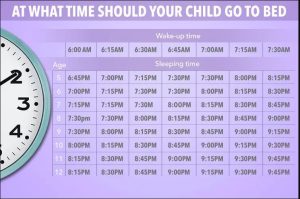As children we were desperate to avoid it; as adults most of us are in hot pursuit of more of it.
And whatever your age, the likelihood is that you’re not getting enough of it.
I’m talking about sleep.
Shut-eye, Zzzz, 40 winks (or much less). Whatever you call it, sleep is both snooze-worthy and phenomenal – those vital hours of total stillness in which your subconscious organizes, rearranges and repairs, making sense of and consolidating your day.
It’s easy to see why this would be important for growing children and teens. And yet, even for grown-ups, is there is anything more tiresome than being nagged about bedtimes?
So, prepare your best teenager-inspired eye-rolls for the chart below, which sets out exactly the time at which sleep scientists say your children should be going to bed every night:
Now there’s no doubt a chart like this can be a rather unpleasant ‘wake-up call’ for many parents. Especially considering the extremely early school starts that we all need to prepare for in just over a week’s time when students return to UAE campuses. With many schools starting classes from 7am onwards, the idea that your five-year-old, who has to get up at 6am, should be going to bed by 6.45pm? Madness, surely!?
But – and I’m sorry to sound like your mum – you’ll be doing yourself and your child a huge favour if you can aim for a bedtime that gives your child the right amount of sleep for their age, and it’s likely that is going to be around the 11-12-hour mark for a five-year-old (although if you’re able to factor in a nap in the day then bedtime can be later).
There are countless scientific studies that show how a lack of quality sleep can be the root cause of multiple problems – from behavioural issues, to learning difficulties, mood disorders and even toileting issues.
Ben Rothwell, Deputy Headteacher at Victory Heights Primary School in Dubai, explains further:
“Good sleep, both in terms of length (at least 10 hours) and sleep quality, is a hugely influential factor on children’s ability to learn.”
“A multitude of studies have demonstrated that a lack of sleep causes significant cognitive impairment – not ideal for blossoming young minds at school!”
“As teachers, we often encounter children facing difficulties with their learning, and it is never surprising when speaking to that child’s parents, that we hear that these children have poor sleep routines. Children are often irritable, drowsy or exhibit difficulty in remembering even the simplest of things.”
Why TODAY is the time to start that back-to-school sleep routine
Most children and teens fall completely out of the usual bedtime routine during the summer holidays. But starting school comes with enough disruptions, without sleep deprivation on top to make things worse, so it’s important to help your child be as rested as possible.
It’s not easy to turn around a sleep routine overnight, but gradually bringing forward your child’s bedtime by 15-30 minutes each night is a tried and tested way of easing them into an earlier routine – which might mean you need to start now.
Paula Phinn, Primary Vice Principal, GEMS Wellington Academy – Al Khail says:
“Try to have a consistent bedtime from at least two weeks before starting school to prepare your child’s body clock.”
Ben Rothwell, Deputy Headteacher of Victory Heights Primary School agrees:
“The key advice I can give, is don’t try and start the day before school begins! Try to ease children into new routines at least a week before school starts. The night before school starts is often stressful (for children and teachers alike) and can cause sleep difficulties, so it is important that good habits are built before that Sunday feeling kicks in.”
The right amount of sleep for your child’s age
Delving deeper into the science, there is thankfully some flexibility when it comes to the exact time that your child goes to sleep, and different children will need different amounts of sleep, within certain boundaries.
The National Sleep Foundation convened an 18-member multidisciplinary expert panel to evaluate all the scientific literature concerning sleep duration recommendations.
The panel found that sufficient sleep duration requirements vary across the lifespan and from child to child. They came up with a set of recommendations which they said are appropriate for all healthy individuals, who are not suffering from a sleep disorder. “Sleep durations outside the recommended range may be appropriate, but deviating far from the normal range is rare. Individuals who habitually sleep outside the normal range may be exhibiting signs or symptoms of serious health problems or, if done volitionally, may be compromising their health and well-being.”
The National Sleep Foundation Age-By-Age Sleep Chart
| Age | Recommended number of hours | May be appropriate number of hours | Not recommended number of hours |
| Newborns 0-3 mo |
14 to 17 | 11 to 13 18 to 19 |
Less than 11 More than 19 |
| Infants 4-11 mo |
12 to 15 | 10 to 11 16 to 18 |
Less than 10 More than 18 |
| Toddlers 1-2 y |
11 to 14 | 9 to 10 15 to 16 |
Less than 9 More than 16 |
| Preschoolers 3-5 y |
10 to 13 | 8 to 9 14 |
Less than 8 More than 14 |
| School-aged children 6-13 y |
9 to 11 | 7 to 8 12 |
Less than 7 More than 12 |
| Teenagers 14-17 y |
8 to 10 | 7 11 |
Less than 7 More than 11 |
| Young adults 18-25 y |
7 to 9 | 6 10 to 11 |
Less than 6 More than 11 |
How to help your child achieve good sleep
Ben Rothwell, Deputy Headteacher at Victory Heights Primary School, shares his advice:
Sleep routines are important for us all, but especially for young children. Consider:
– No devices for at least an hour before bed time
– Choose a regular bedtime that allows at least 10 hours sleep before the child needs to wake up
– Engage in physical activity in the late afternoon/evening
– Don’t eat too close to bedtime, as digestion issues can impair sleep
– Wind down before bed, consider calming activities like taking a bath to reduce stimulation
© SchoolsCompared.com. A WhichMedia Group publication. 2022. All rights reserved.































































Thank you my kids are in year 3 and go to sleep on 10 because of homework now I am going to let them sleep on 7 pm